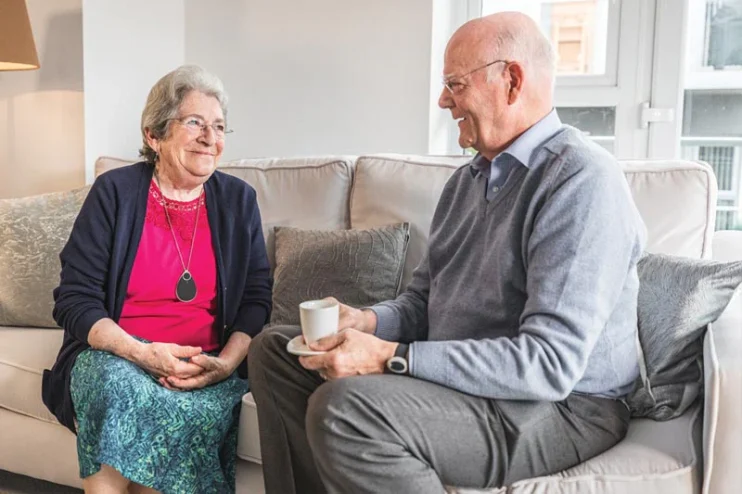Personal alarms for independence and reassurance
As we age, it’s common to experience health issues, or start to feel a little unsteady on our feet. But with the right support, we can still continue to live happy, active lives in our own homes or when out-and-about. These days, technology enabled care, and more specifically personal alarms, have a range of features designed to help maintain independence, whilst giving reassurance to the user and their families, that help is available should it be needed.
What are personal alarms?
Monitored personal alarms are small wearable pendants that include a panic button. They can be worn around the neck or wrist, at home or on the go, and they can connect you to a trained professional in an emergency or if you have a concern. Some alarms have additional features beyond calling for help, such as fall detection and GPS tracking.
Most monitored alarms work in a similar way:
- If you fall or feel unwell, or are even worried about an intruder, you can press the button on the alarm any time of the day or night to reach an Emergency Resolution Team
- They will speak with the user through the alarm equipment and quickly assess the situation
- If further help is required, the team will call family members, neighbours or friends who have been nominated as a point of contact
- Emergency services will be called if medical assistance is needed, or if family and friends can’t be reached
When might you consider getting a personal alarm?
Whether you live alone or with others, you may worry what would happen if you had a fall or felt unwell when you were alone. Maybe you’re recovering at home after a hospital stay. How would you reach help if you needed it? Or perhaps you don’t feel as confident as you used to in carrying on with an active life outside the home.
A personal alarm can provide reassurance and peace of mind in all these situations, allowing the wearer to live independently, safe in the knowledge they can get help when needed.
What features do personal alarms have?
24/7 monitoring
The main feature of personal alarms is their connection to emergency assistance at any time of the day or night, 365 days of the year. A press of the button or detection of a fall, dependent on the type of alarm, will quickly place a call through to a highly trained Emergency Resolution Team, who will be able to alert nominated family or friends to provide assistance, or contact the emergency services if necessary.
Comfortable wearable options
Personal alarms are designed to be worn at all times so that they’re always within reach, therefore they need to be comfortable and not interfere with the day-to-day activities of the wearer. One feature to consider when choosing a personal alarm is how you would like to wear your alarm, for example around your wrist, as an alarm necklace or attached to a key ring.
Fall detection
If you like being active and you’ve fallen before or are worried about falling, a personal alarm with in-built fall-detection can provide an added layer of security. When a hard fall is detected the fall alarm will automatically trigger an alarm call directly to the Emergency Resolution Team who will take the necessary action. Even if the wearer is unable to speak, they can be assured that appropriate help will be sent.
GPS tracking
Personal alarms aren’t just for inside the home. Many have GPS location tracking, enabling the wearer to go out and continue their usual activities, such as visiting friends, going to the shops or even taking a few days’ break away from home, knowing that if they need help, they can be quickly located and assistance can be sent.
Two-way communication
Personal alarms have a two-way communication feature that allows you to speak directly with the Emergency Resolution Team. Some devices have a powerful speaker and microphone built into the base unit, which means that the emergency operators can communicate with you even if you are in another room or out in the garden. With some other products, you can speak directly into the pendant so you can get help when you are out-and-about.
Wear in the bathroom or shower
Falls often happen in wet room areas, which is why many alarms are water-resistant, allowing you to keep wearing them whilst washing.
Digital technology
By 2025, all analogue phone lines will be replaced with digital ones. Most personal alarms are now therefore fully digital, meaning that they will work beyond the digital switchover and don’t rely on a telephone landline.
Long-lasting battery life
One of the benefits of a personal alarm over a mobile phone, is that you can always have it on you. A long-lasting battery means you don’t need to worry about charging it or the battery running down. Some in-home personal alarms have a battery that lasts for 5 years. GPS alarms that work out-and-about and in-home may have a battery that lasts over a month before it needs charging.
How can a personal alarm benefit an older adult?
Personal alarms are designed to support older adults to continue living safely and independently in their own homes. They provide various benefits to the wearer:
- 24/7 emergency assistance – in the event of a fall, feeling unwell, an accident or even worrying about an intruder, a personal alarm is a lifeline to fast assistance, day or night
- Feeling independent in your own home or out-and-about – a personal alarm allows you to carry on living life on your terms
- Confidence when living alone – knowing that help is there at the push of a button
- Peace of mind for the wearer and their families – reassurance that if the worst happens, the right assistance will be available at the right time
- Cost-effective alternative to care – a personal alarm can be more economical and emotionally advantageous than a care home or in-home care
How do you pay for a personal alarm?
Personal alarms are available with a monthly or annual subscriptions. The alarm device and monitoring costs are included in your personal alarm package. Many alarms are rented and you return them when you end the subscription, which helps to keep the costs down. If you opt for an annual subscription, this could bring the cost down even further if the personal alarm provider offers discounts.
Smart home monitoring systems
Smart home monitoring systems can work alongside a personal alarm and use advanced technology to detect when something is wrong, such as a change in daily living activities that could indicate a problem. If you don’t wish to wear a wearable alarm, these systems are worth considering as an unobtrusive option to provide reassurance to the user and their family.
Taking Care personal alarms
Our partner, Taking Care, has supported over a ¼ million people and their families with personal alarms. Backed by AXA Health, Taking Care has been providing personal alarm services for over 30 years. The first Which? Trusted Trader Approved personal alarm service, Taking Care is committed to enabling older adults to remain independent in their own homes for longer and offers a range of services to suit every lifestyle.


